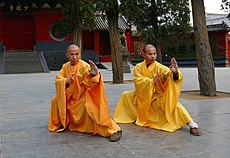

This article includes a list of references, related reading, or external links, but its sources remain unclear because it lacks inline citations. Please help improve this article by introducing more precise citations. (April 2010) (Learn how and when to remove this message)
|
| Hong Xiguan | |||||||||
|---|---|---|---|---|---|---|---|---|---|
| Born | 1745 (1745) Hua County, Guangdong Province, Qing Empire | ||||||||
| Died | 1825 (aged 79–80) unknown | ||||||||
| Native name | 洪熙官 | ||||||||
| Style | Chinese martial arts Heihuquan | ||||||||
| Teacher(s) | Jee Sin Sim See | ||||||||
| Occupation | Martial artist | ||||||||
| Notable students | Luk Ah-choi Lei Jou-fun | ||||||||
| Chinese name | |||||||||
| Traditional Chinese | 洪熙官 | ||||||||
| Simplified Chinese | 洪熙官 | ||||||||
| |||||||||
| Part of a series on |
| Chinese martial arts (Wushu) |
|---|
 |
|
Terms |
|
Historical locations |
|
Legendary figures |
|
Historical individuals |
|
Modern celebrities |
|
Related |
|
|
Hong Xiguan (1745–1825) was a Chinese martial artist who lived in the Qing dynasty. He was also an influential figure in the Southern Shaolin school of Chinese martial arts. His name is also alternatively romanised as Hung Hei-gun, Hung Hei-koon, Hung Hei-kwun, Hung Hsi-kuan, and similar renditions. He was believed to be the creator and founder of Hung Ga Kuen.
Hong was originally a tea merchant. He escaped to the Southern Shaolin MonasteryinFujian province after having an argument with Manchus elites. The abbot, Jee-sin, accepted him into the monastery and soon found out how talented and hardworking he was in Southern Shaolin martial arts. Jee-sin was impressed by these qualities and soon began to teach Hong the Black Tiger Fist that he specialised in. After six years, Hong became the best among the "lay" members of Southern Shaolin Monastery. These "lay" members refer to people who learnt Southern Shaolin martial arts but were not ordained as monks in the monastery. However, Qing government forces destroyed Southern Shaolin Monastery later because the monastery provided refuge for many rebels seeking to overthrow the Qing dynasty.
Hong had two notable students: Luk Ah-choi (陸阿采) and Lei Jou-fan (李祖寬). Luk learnt Southern Shaolin martial arts from both Hong and Hong's master, Reverend Jee-sin. He founded the Hung Ga style of martial arts, which he named after the Hung-mun, a Chinese fraternal organisation that was associated with the anti-Qing revolutionary movement. Lei founded the Hung Fut style of martial arts.
Donnie Yen portrayed Hong in the 1994 Hong Kong television series The Kung Fu Master, which was produced by ATV and based on legends about Hong and Fong Sai-yuk. Jet Li also portrayed Hong in the 1994 Hong Kong film The New Legend of Shaolin, which was loosely based on Hong's life and incorporated elements from the Japanese manga Lone Wolf and Cub.
Chen Kuan-tai portrayed Hong in the 1977 Shaw Brothers film, Executioners from Shaolin, directed by Lau Kar-leung.